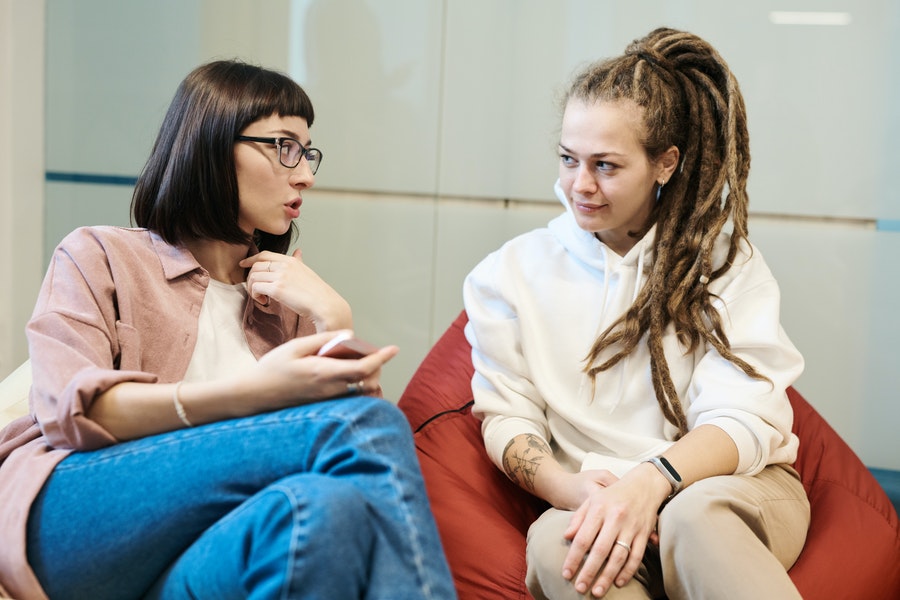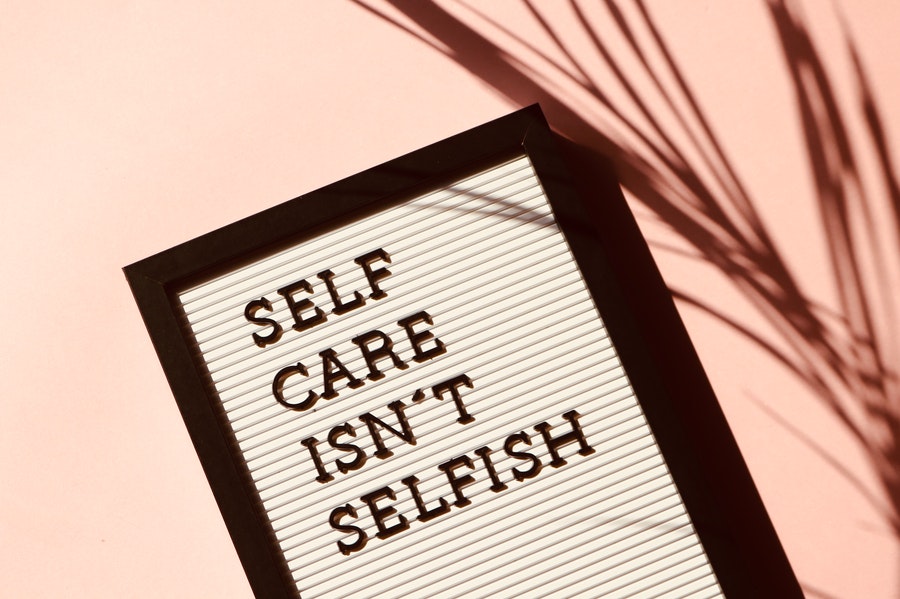
Kate, who is 19, recently shared her experiences with us of receiving peer support through our Early Intervention Recovery Program, the different steppingstones that have given her strength and confidence to change her life, and how having a peer worker has helped her stay on track on her recovery journey.
I first engaged with MIFWA in December 2020 through the Hospital to Home Program and continued until about March, when I then engaged with the Early Intervention Recovery Program for young adults.
The Hospital to Home Program was really good. I had just been discharged from the hospital from a mental health ward. It helped to not be alone for the first two to three months after getting out of hospital. I don’t think anybody knows—unless they’ve been in that situation—what it can be like. You’re in a hospital where there’s 24-hour care. There are people there all the time to talk to you, to see you and help you.
“You get discharged… and there’s nothing.”
But then, unfortunately this is how the mental health system is in this country, you get discharged and there’s nothing. There’s not a flow from hospital to home most of the time. From my experience, you’re going from 24/7 support to then nothing.
What the Hospital to Home Program did for me was it continued that care to a degree and it gave me someone to talk to, because in hospital it’s not always great. What was good about the program was the peer support from people who had been in these situations and had similarities to yours.
“There is nothing wrong with you.”
An essential aspect of any peer support worker is having lived experience, because it’s hard enough to ‘get it’, to understand it in your own head when you’re going through it, and it helps to have someone who’s come out the other side of it and can say, “Okay, you’re not the only one feeling this, and this is normal. There’s nothing wrong with you. I know you are going to get through it, and these are some things that helped me.”
Early intervention motivated me to write things down to help me recover
I went into the Early Intervention Recovery Program (EIRP) with several goals. One of them was to write a letter about the trauma I’d experienced while in the mental health system. I had an involuntary admission where it made me worse rather than better. The support through the EIRP helped me write that letter and submit it to several places in the hope there would be some kind of action from it. I’ve done all those things, even though nothing much came from it. This highlights how broken the public mental health system is.
What this letter did, was it helped me be heard. It helped me understand and communicate what I went through and how harmful it was on me. I didn’t entirely understand until it was written down and when I read it and I was like, “Oh my God, I went through a lot.”
“I didn’t entirely understand until it was written down.”

My initial hopes were to write this letter and submit it to the hospital and areas that deal with complaints of practitioners and healthcare facilities. What I wanted didn’t necessarily come from that, but what actually came was something I didn’t expect. It was a lot of self-growth and understanding.
Writing helps. I have always found when writing that once you get something out of your mind that has been there circling around, it frees you up a bit. If it’s not out, it’s circling around, it’s escalating and it’s opening doors that don’t need to be opened. Once you get it out, it helps you think differently.
How I benefited from setting realistic goals
With my goals, I’m on the way to achieving them.
With goals, I think some people think there’s just an end result. They don’t have steppingstones within that goal. You can set out with a goal, but that goal can change. Like with my goal to write the letter, I thought my end goal was “to submit it and get some action from it”. But it turned out there were several steppingstones. I reached them, understanding what I went through, giving myself the time to work through it and understand a lot more about myself, why it happened, and how I reacted. It’s a goal I’m reaching day by day.
“Set a goal, have a rough amount of time on it, but make sure it can still change.”
I think what’s important is to set time on something, but not so you end up putting pressure on yourself. That’s just expectation, and then you could get disappointed and then the cycle begins again. Set a goal, have a rough amount of time on it, but make sure it can still change.
Looking back helps
What keeps me going when I feel like, “Okay, it’s taking longer than I thought.”
I think it’s important to have things written down you can go back to and be like, “Well, I’ve come so far. Even though right now my brain is struggling to think that I haven’t.”
When you write things down and you journal, looking back keeps you going. Say you wrote something two months ago and you read it as the person you are now. You can reflect on it and go, “Wow, I’ve changed so much since I did this two months ago, and my perspective and my thinking, my understanding wasn’t where I am now, with my thinking and my healing and all that.”
Setting boundaries with other people
A big part of the Early Intervention Recovery Program is helping to set boundaries in relationships, which is as important as communicating boundaries to other people. I did this with my friends. When I communicated a boundary, it essentially meant we weren’t friends anymore and even though that is hard and hurtful, I look back and I’m glad it happened, because I’ve been able to grow without that person in a positive way.
“When you start recognising boundaries and realising it’s not healthy, you can start communicating to people who have been treating you that way.”

By setting boundaries, you are available for them but ensuring you’re taking care of yourself first and not tolerating actions and behaviours that aren’t helpful or healthy. It’s not necessarily ghosting them and not speaking to them anymore.
If they’re mistreating you, they’re hurting you. Growing up, that’s all I knew. I have a lot of wounds and trauma from my childhood associated with that. If you go into relationships and friendships and you think it’s normal…No, it’s not normal and it’s not okay.
When you start recognising boundaries and realising it’s not healthy, you can start communicating to people who have been treating you that way. That’s healthy, because it stops a negative thing surrounding you, bringing you down and stops you from being able to heal. It also helps you to heal your inner child. That kid that wasn’t able to communicate, that wasn’t able to say you’re treating me in a way I don’t like. It’s a major milestone in your life to be able to do that.
Being supported by a peer worker
My peer workers are like a guide to me. I can see them on a regular basis and share what I’ve achieved. It’s more like they were a guiding light.
I’ll use ‘therapy’ as an example. In that one-hour session, you don’t fix everything and they don’t tell you how to fix everything. A lot of it is giving you the strategies and the skills to work on your life outside of therapy and support groups. Coming to them and being like, “With what we discussed and the strategies you gave, I was able to do those things”. That’s a great thing. And then you again take those steppingstones towards your goals and continue to learn and keep going.
What to expect when going into the EIRP
You get someone who gels with you. They don’t just assign you to a random person. They go, “These people have these similarities, they would get along.” And then they connect you. They don’t go in and ask you every week, “Are you okay? What’s happening with this?”
We set goals, things that you’ve been wanting to achieve, and they help you work towards them.
“They genuinely care and are proud of you.”
It’s not just someone that is a blank piece of paper and you’re only a number to them. You get to know them, and they genuinely care and are proud of you. That’s what a lot of people need. I didn’t grow up with that. It’s a great feeling for somebody to go, “Well done, I’m proud of you.”
My experience with a lot of mental health programs and hospitals is the feeling that no one cared. And realising there are people who do care about you. That you’re not all alone, and there are people who want the best for you who aren’t going to either intentionally or unintentionally make it worse for you. This is great.
My advice for young people facing similar mental health challenges
It’s terrifying to ask for help and engage in things if you’ve had bad experiences or heard bad experiences. But I think what’s important is to try. Something I came across a long time ago was “Be brave when you’re afraid”. Essentially this means you can be afraid but do it anyway.
“Be brave when you’re afraid.”
Over time, you will take steps and realise you’re not afraid anymore, that you’ve been brave and you’ve gotten to the point where it’s helped you.
Peer support helped me through my education
I recently graduated as a nurse, and I’m working. It was scary, I studied for a year and a half and have been working for about four months now.
What’s next for me is working in a career I’ve wanted since I was six years old and finding where I want to be in that. I would love to go into some form of mental health nursing either be in a hospital or in a community-based opportunity and be the person or be the support I didn’t always get in hospital. It’s something I really want to do. At the same time, continuing to work on myself, because it takes a lifetime to work on yourself and heal from things that damaged you as a child and/or as an adult.
“I would love to…be the support I didn’t always get in hospital.”
There were hundreds of times where I wanted to give up on my goals and on life. What helped me was having things planned to look forward to. For a long time, I didn’t have anything planned and struggled to see that far ahead. I’ve been in a position where three weeks felt like a lifetime but having goals set out with someone to support me in the process has helped a lot. Over time, three weeks doesn’t feel like a lifetime – it feels like something I can do.
How to get the most out of the EIRP
With the Early Intervention Recovery Program, know that you’re in control when you go into it. You’re guiding it and if you ever feel like you’re being pushed, you can say, “No, I’m not ready for this”, and that’s okay. They’ll listen to you.
When you sign up for the program, you don’t have to do the full year if it’s not for you, or if you feel like you don’t need it anymore because you have gotten past it, or you’ve achieved your goals. You can also ask for a different peer worker, because as much as they try to find someone you fit with, sometimes we won’t always get that right. We’re human. Just know that you can say yes, and, more importantly, you can say no and no one’s going to take it personally. That is you setting a healthy boundary for them and yourself.
“You’re in control.”
With the meetings, which are usually weekly or fortnightly, you can always say, “I’m really not feeling like doing this right now.” Or, because we usually met at cafés, I could at any time go, “I really don’t feel like meeting in a crowded public space. Can we go to somewhere like a park that’s near a café? Grab a takeaway and go there where it’s calmer and quieter. I’ll feel more relaxed.”
It’s in your control. They’re going to accommodate to you the best they can so you’re comfortable and you’re feeling okay. I think that’s important to know, and to know that the support is available. A lot of the time as an in-patient, things aren’t in your control, there’s a lot of rules and you don’t feel like it’s going the way you need it to go.
With MIFWA, you’re in control and they’re going to listen to you. It’s your story, no one’s going to write it for you. They’re maybe going to give you prompts, but it’s your story.
What is the Early Intervention Recovery Program?
The MIFWA Early Intervention Recovery Program (EIRP) is for young people aged 16 to 30 years who have been diagnosed with a mental illness including first episode of psychosis. Operating across the Perth Metropolitan area, our EIRP team supports people to re-establish or maintain social, professional and educational networks. The program is initially for 6 months but can continue for up to one year. Continue reading…
Share

